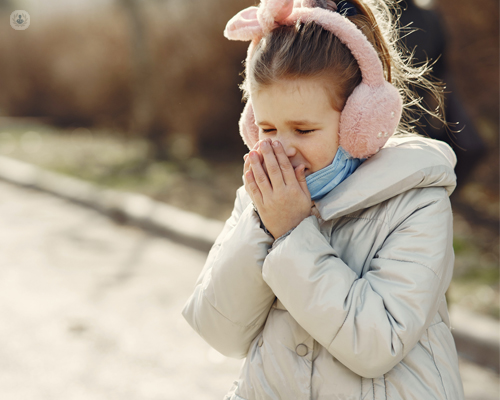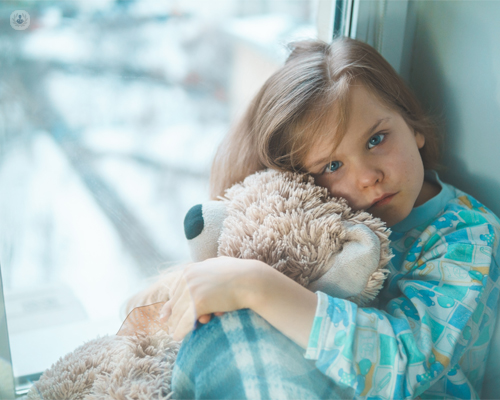To worry or not to worry: chronic cough in children
Escrito por:A cough is a muscle reflex to remove phlegm, mucus, and irritants out of the throat and airways. There are a variety of reasons for coughs, such as swallowing something incorrectly or an infection in the chest. Unusually, it is a sign of something serious, but knowing how to treat coughs and when to seek help is important. Professor Parviz Habibi, a leading consultant paediatrist specialising in respiratory disease, provides the must-know information about chronic coughs in children.

What are the symptoms of chronic cough in children?
There are two main types of coughs, and knowing what kind your child has can help if seeking advice on treatment from a pharmacist or doctor is needed. One is dry and tickly; the other is a chesty cough that may produce phlegm or mucus. Distinctive sounds may also be produced by some coughs. As your child takes a breath in, listen for barking coughs with a harsh sound, or listen for a whooping noise when your child breathes in following a coughing fit. These may be signs of croup or whooping cough. Keep an eye out for other symptoms that could be associated with a cough, like flu-symptoms or a rash.
Even though coughs might last longer than the cold or the flu, they normally should clear up in about three weeks. If your child keeps catching new infections or the coughing has become a habit irritating the lungs, a cough may seem to last longer. In some cases, a cough that is persistent might be a sign of something more serious and needs to be checked by a medical professional.
What are causes of chronic cough in children?
There are a wide range of different conditions where coughing is a symptom. The most likely causes are respiratory tract infection, cold, or influenza. Occasionally it may be caused by a more serious infection, such as pneumonia. Chest infections create mucus build up in the child’s lungs, so he or she coughs to remove it. Not only chest, but also nose and throat infections can create mucus that trickles down the throat resulting in coughs. Environmental factors, like irritants such as cigarette smoke or allergens such as pollen, may also trigger coughing.
Children are more prone to some types of coughs than adults. Three of these include:
- Bronchiolitis: a mild respiratory infection causing coughing.
- Croup: an infection that typically occurs between six months and three years old, which causes a barking cough a stridor (harsh sound that happens when the child breathes in).
- Whooping cough: as the child breathes in, there is an intense bout of coughing and can be severe enough to cause vomiting after.
Most of coughs in children will go away within a few weeks even without specific treatment. If coughing is due to a bacterial chest infection, then antibiotics may be prescribed by your doctor. A cough that doesn't go away could be caused by an allergy, asthma, or cystic fibrosis, so it’s important to seek help.

What is the diagnosis and treatment for chronic cough in children?
Treating a cough first requires finding out what is causing it. Simply looking at the symptoms and a physical examination is all that’s needed to make a diagnosis. However, in other cases further testing may be needed. For example, a lab may need to test mucus to determine a specific lunch infection, or a lung function test to check for asthma.
Many of the coughs’ children contract may be taken care of the same way as the flu, involving fluids, plenty of rest, painkillers as needed, and reassurance. If the child is over one year old, a warm drink of lemon and honey may be given to soothe the throat. If the child is under six years old, they should not be given over-the-counter medication. These medications should be given only to children older than six years old and with doctor or pharmacist advice.
Depending on the cause, a doctor may also provide additional treatment for the cough. Antibiotics may be given to treat a bacterial chest infection. If the cough and/or infection is severe enough, they may need to be treated in hospital—especially if complications arise. You might need to seek a specialist if conditions for allergies and asthma are bad enough.
When should you seek a doctor?
You likely don’t need to see a doctor if your child is coughing but eating, drinking, and breathing as normal. A cough can sound worse than it is, especially when coughing up mucus, and they can be irritating at night, but they aren’t usually anything serious. Although, if there is wheezing or breathlessness, a rash or a high fever, or the cough doesn’t go away, the cough is more severe and you should seek medical advice. If your child continues to get coughs and infections or seems to be triggered by exercise or specific allergens, it is a good idea to see a doctor.


